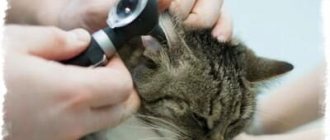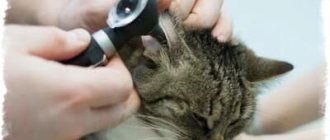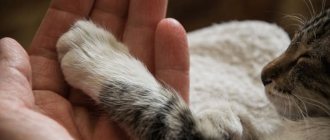When we get pets, particularly cats, we must remember that health is a very important aspect. A living creature requires attention and care. And how you care for your cat will determine its vital activity. It's good when the cat is energetic, has an excellent appetite and there are no signs that something is wrong with it. But if you suddenly notice that your pet has begun to behave differently, something is bothering her, she has become less active, and is not eating well, then this means that not everything is in order with her health and something needs to be done. The first thing is to observe how often the cat begins to go to the toilet in small ways. Perhaps this is the essence of such changes in her behavior.
Healthy cat
Frequent visits to the litter box may be a warning sign that your pet is sick. It is considered normal if a cat goes to the toilet 2-3 times a day. This should be quite enough for her. At the same time, the process of urination does not cause her any discomfort. Urine is light yellow or orange in color and does not have a pungent or unpleasant odor. The most innocuous reason for a cat to pee frequently is that it is drinking large amounts of water, perhaps because it is hot or because it has eaten salty food. Old age may also be the cause of frequent urge to go to the toilet. With age, muscles weaken and urine retention becomes weaker. In these cases, there is no reason for great excitement.
Territory
Some cats may have a strong territorial nature and they may not allow other cats to use the same litter box.
If you have multiple cats in your home and you share one litter box for multiple cats, territorial conflict will arise.
A stronger cat will sit in the litter box most of the time to prevent other cats from using it. If other cats approach the litter box, the stronger cat will reach out and look at them.
Weak cats often develop urinary tract problems due to the lack of a litter box. Hence, you need to take due care in this case and introduce new cat litter into your home.
The cat pees often
But what if the reason is not in drinking a large amount of liquid or in old age? Then why does the cat pee often? Perhaps something is bothering her, and in this way she is trying to draw attention to herself and what hurts her. Don't punish her. Show understanding and increased care towards it, because the animal cannot say what exactly is bothering it, and is not able to help itself. First, watch your cat closely. If her general condition does not indicate that she may be sick with something, then the reason must be sought in her psychology. But if you notice that your pet has become lethargic and weak, its urine has an unpleasant odor, it contains purulent or bloody discharge, it becomes dark or cloudy in color, if you notice that the process of urination causes pain, then it’s time to sound the alarm - your cat is seriously ill. In this case, the sooner you determine what’s wrong with your pet and begin treatment, the better for his health and life.
Symptom: cat peeing for a long time
- home
- Symptoms
- The cat pees for a long time
Acute urinary retention is the most common and life-threatening complication of the so-called feline urological syndrome. The main symptoms of feline urological syndrome:
- frequent urination in small portions, often in unusual places;
- pain and difficulty urinating;
- the appearance of salts, mucus and blood in the urine.
The causes are inflammatory diseases of the urinary system, mainly its lower parts - the bladder and urethra, urolithiasis, and much less often - tumors. The symptoms listed above are associated with inflammation of the affected organ and pain, the appearance of abnormal inclusions in the urine and often obstructions to the normal flow of urine. An animal suffering from this disease is characterized by a tense, unnatural posture, indicating impaired urination.
Acute urinary retention occurs due to blockage of the urethra by mucus, crystals, blood clots and small stones, and occurs almost exclusively in cats, and is extremely rare in cats.
The anatomical structure of the lower urinary tract in males (males, males) and females (cats, females) is different. The urethra (the channel through which urine is removed from the bladder) in females is short and wide. Because of this, complete blockage of the urinary tract rarely occurs in females. Most often, the symptoms of inflammation are limited to a frequent, painful urge to pee, and blood may also be noticeable in the urine.
For the “stronger sex” everything is much more complicated. The urethra in male and female cats has a narrow, long and curved structure. Because of this, any inflammatory processes in the urinary tract can lead to significant difficulty in the outflow of urine from the bladder. Often, complete blockage of the urethra and cessation of urine excretion from the body are diagnosed.
Urinary retention is an emergency, and if your animal cannot pee within 24 hours, you should urgently take him to the veterinary clinic. It is important to understand that toxins are removed from the body through urine. Stagnation of urine in the bladder is a condition for the onset of intoxication in the animal’s body.
Under no circumstances should you try to squeeze out urine or perform catheterization on your own using a massage. It would also be a big mistake to use diuretics. If there is no urination for more than a day, do not waste time and urgently take the animal to the doctor.
Osipova Zhanna Valerievna
Veterinary surgeon, ultrasound specialist.
Remember that your pet cannot speak, he quietly carries the problem within himself, and if you notice any changes that affect the life of your pet, it is better to contact a professional veterinarian and avoid potential problems. Our clinic is open 24 hours a day, you can make an appointment by phone or use other methods.
Whatsapp chat
Make an appointment
Possible diseases
There are several diseases, a symptom of which may be that the cat pees very often and little. These are diseases of the genitourinary system. Some of them can be very insidious. What disease your cat has can be determined, of course, only by a veterinarian after examination and passing all the necessary tests. It is strongly not recommended to engage in treatment or give any medications on your own without a doctor’s prescription, without even knowing what happened to your cat. Your pet may only get worse and you will waste time.
What to do if your cat doesn't pee?
Cat owners should provide litter boxes for their kittens at all times so they can relieve themselves. And if you plan to take your cat on a long trip, it's best to take her out of the car at least every six hours for her needs.
Because cats have a relatively short period of time when serious health problems can worsen due to lack of urination, you need to take your feline friend to the vet immediately if you notice this problem.
However, as a cat parent, you should have a basic understanding of how your cat's urinary tract works so that you can know if something is wrong with your cat.
Essentially, a cat's urinary system consists of kidneys that filter waste and send it to the ureter, the tube that connects to the bladder, and finally the urethra (the tube through which urine exits the bladder).
It is after something goes wrong with your kitten's urinary system that he stops urinating as regularly as he should because there is usually no obstruction to the process.
Pollakiuria, its causes and symptoms
So, your cat pees often, what should you do? Pollakiuria is frequent urination in animals. Psychological and physiological factors can influence its development. If we consider pollakiuria from the psychological point of view, then we, of course, must understand that cats, like people, are exposed to stress. Any change in the cat’s life that has become a serious stress for it can become an impetus for a behavioral disorder. This could be a change of place of residence, renovation, the birth of a child in the family in which she lives. Such changes are sometimes perceived negatively by the cat, and she, in turn, simply begins to take revenge by going to the toilet in the wrong places.
Let's look at the physiological reasons why a cat often pees. This may be kidney failure, which is characterized by bad breath, heavy breathing and very poor general condition of the animal. The next reason is diabetes. It smells like acetone. The cat has constant thirst, weakness, and deterioration in the condition of the coat. Another cause is kidney stones, in which it is very difficult for the animal to go to the toilet, and urine comes out with blood, and this is accompanied by vomiting, fever, and lethargy. If you miss the moment and do not start treatment on time, the animal may not survive.
Cystitis
The most common and hard-to-treat disease in cats is cystitis, an inflammation of the mucous membrane of the bladder. This disease can be provoked by eating low-quality, cheap food, as well as various infections and the formation of kidney stones. It is also unsafe for owners to have close contact with sick animals, as there is a high risk of infection. Initially, the disease is almost impossible to recognize, only over time the symptoms become more obvious. Cystitis is divided into two types: acute and chronic. Chronic cystitis most often occurs in older cats. Acute develops into chronic, and if your cat is not treated in time, purulent processes may occur that can lead to peritonitis.
Causes of this disease
Let's take a closer look at the causes of cystitis in cats, because there are many of them, and owners need to know them to prevent the disease:
- An unbalanced diet, overeating, feeding dry food, especially cheap food, contribute to the development of cystitis. The amount of salts in the urine increases, and the kidneys cannot cope with their function, the urethra becomes clogged.
- The animal is exposed to the cold for a long time.
- The presence of parasites such as ticks, fleas, and worms contributes to the rapid development of the disease.
- Stress.
- Viral and bacterial infections, which may be congenital.
- Exacerbation of pyelonephritis (kidney disease caused by bacteria) and urolithiasis.
Treatment of cystitis
To make an accurate diagnosis, the animal is given an ultrasound and blood and urine samples are taken. Only after this the veterinarian prescribes treatment, which necessarily includes antispasmodics and antibacterial drugs. Cystitis is mainly treated with antibiotics. Also, in some cases, the veterinarian may prescribe washing the bladder with potassium permanganate or furatsilin. In parallel with this, it is necessary to take homeopathic and diuretic medications and do not forget about vitamins, which will also be useful for your pet. In especially severe and advanced cases, surgery has to be performed. Therefore, to prevent your cat from developing cystitis, pay close attention to her diet and, if possible, observe how often she runs to the litter box.
Hematuria in cats
Why does a cat often pee in small amounts of blood? In this situation, your animal has hematuria. It is with this disease that urination is accompanied by bloody discharge. There can be many reasons for hematuria: injuries and blows to the genital organs, hypothermia, poisoning, worms, falls, reactions to some medications. The urine then becomes reddish, and in advanced forms of the disease, blood clots appear in it. Symptoms of the disease include vomiting blood, lethargy, and pain when trying to pee. As soon as you notice these signs, immediately take your animal to undergo all necessary tests (urine and blood tests, ultrasound, abdominal x-ray, vaginal smear, etc.) and to see a veterinarian.
Treatment
If your cat frequently pees blood, do not treat it yourself. After examination and tests, the doctor will prescribe the necessary treatment for your pet. Usually it necessarily includes antibiotics, painkillers, vitamin K1, and when the body is dehydrated, glucose or saline is introduced. If stones need to be removed, then surgery is required. To prevent the occurrence of this disease, as with cystitis, you need to monitor your cat's diet. You should also not let her go outside to avoid contact with infected animals. Don't forget to give her deworming medicine regularly.
Why doesn't the cat pee?
There are several reasons why a cat may not pee. It is important to determine the reason why your cat is not urinating in order to solve the problem and keep your cat healthy.
- Stress . Many cats don't pee if they feel stressed. There are a number of reasons why your cat might be feeling stressed - maybe they're in a new environment or have met a new animal, maybe they're not feeling well, or maybe their daily routine has changed.
- Trauma, damage . If your cat has been injured and has lost mobility, she will likely be reluctant to move any more than she should. They may have difficulty getting in and out of the litter box or even standing up, so they will be very reluctant to try to pee.
- Problems with urination . If your cat isn't peeing, there's a good chance she has a urinary tract problem. They may have a bladder stone or other blockage, or they may be struggling with Pandora's syndrome, which is a very painful inflammation of the urinary tract.
- Dehydration . If your cat doesn't have enough water, she will eventually stop urinating. Dehydration can be very dangerous for cats, so it is important to make sure they always have access to enough water.
Veterinarian advice
When treatment is completed and your pet’s illness is behind you, it is important to remember that if you do not follow the rules of caring for it, a relapse may occur, and the disease will begin to progress with renewed vigor. This is especially true for cystitis.
Veterinarians recommend following preventive measures to prevent these difficult-to-treat diseases. The main thing is to feed your pets with high-quality food and provide them with the healthiest nutrition possible. If you want your cat to be healthy and energetic, then under no circumstances should you feed her cheap food. It contains chemicals that have absolutely no beneficial properties, but can only cause harm and lead to the occurrence of such serious diseases that will be very difficult to cure later. Do not allow a cat who has had an illness to sleep in the cold and become hypothermic. You need to make sure your cat drinks enough clean water. Also, in order to avoid contracting various infections, veterinarians advise that their pets be vaccinated. And if your cat has been diagnosed with one of these diseases, then periodically, for insurance, show it to a specialist. After all, you see, it’s easier to adhere to these precautions than to endanger the health and life of your beloved animal.
Improper urination
When a cat sits in the tray for a long time, it may be sick. If your cat won't move away from the litter box, she may be suffering from dysuria.
In this condition, cats are unable to urinate properly and this can lead to blood in the urine, increased frequency of urination, unproductive urination, and more.
As they helplessly try to urinate and are unable to urinate properly, they begin to spend most of their time in the litter box. It can also lead to exhaustion, fatigue and nausea as they constantly try to urinate.











